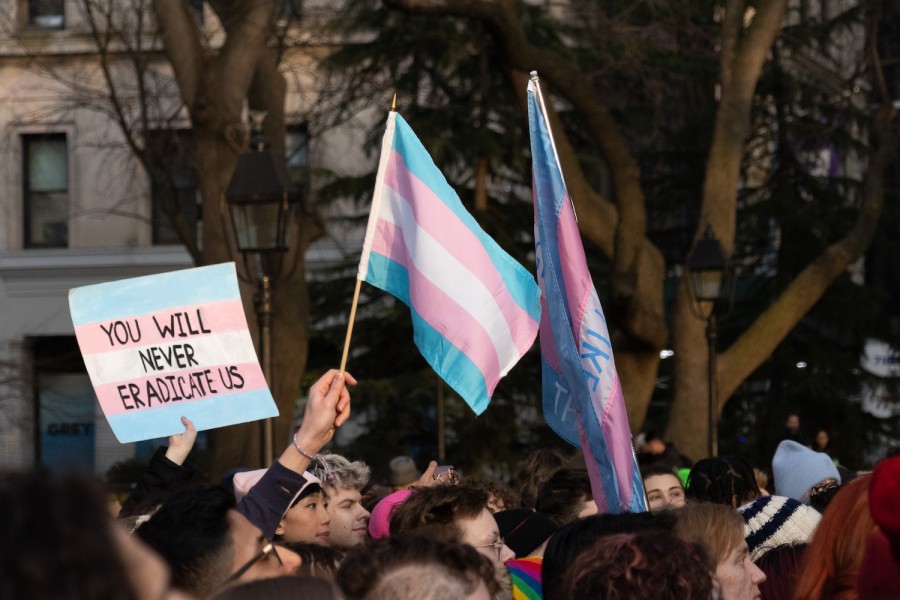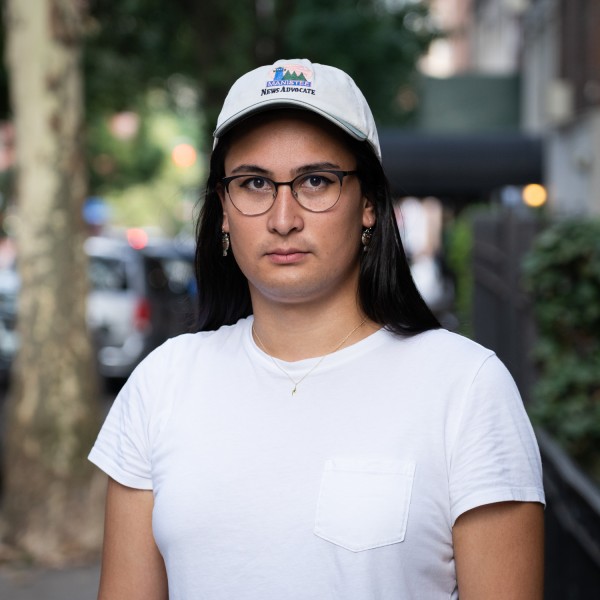For trans people, what comes after visibility?
This year’s Transgender Day of Visibility rally was a chance for trans people to affirm their existence — and to consider how we can go beyond merely being seen.
After marching from Union Square Park, demonstrators gathered in Washington Square Park to commemorate International Transgender Day of Visibility. (Alex Tey for WSN)
April 6, 2023
Transgender Day of Visibility, celebrated annually on the last day of March, is a complicated day for me. I often feel like I’d prefer to be invisible.
This year, though, I decided to go attend a Trans Day of Visibility demonstration and reckon with my doubts later. I followed the crowd of protesters as they marched from Union Square down University Place and into Washington Square Park.
Seeing a thousand people like me in the street expressing joy, rage, love, defiance, exuberance — it was beautiful and powerful and all of that. But I tend to overthink things, and I got to wondering. What good is visibility anyway?
Part of me exulted in seeing and being seen by other trans people. Every trans person deserves to feel the joy of being seen as who they truly are. But another part of me felt more pessimistic — you can’t ask for much less than just being seen. “Visibility” describes an interaction that doesn’t go below the surface, and trans people deserve support that is more than superficial.
A common refrain around Trans Day of Visibility — one that I saw on several signs at the rally — maintains that visibility without protection is a trap. Being seen as trans can make you a target of violence. Vulnerability and visibility go hand in hand.
I asked writer and activist Eli Erlick, who I spotted in the crowd at Washington Square Park, what she felt the purpose of the protest was. She said that rallies like this one are a chance to support and listen to those most affected by rising transphobia. While the day has historically been one of celebration, it should also be a day of resistance against attacks on trans people, especially young trans people.
“It’s really important to not just learn about our community, but also get involved,” Erlick said. “Actively listening to trans youth is so crucial right now.”
This year’s rally was organized by high schoolers with NYC Youth for Trans Rights, who have been protesting laws targeting trans youth for months. Young trans people across the country are facing an onslaught of legislation seeking to ban them from participating in sports, accessing gender-affirming health care, and using bathrooms and locker rooms that align with their gender identity.
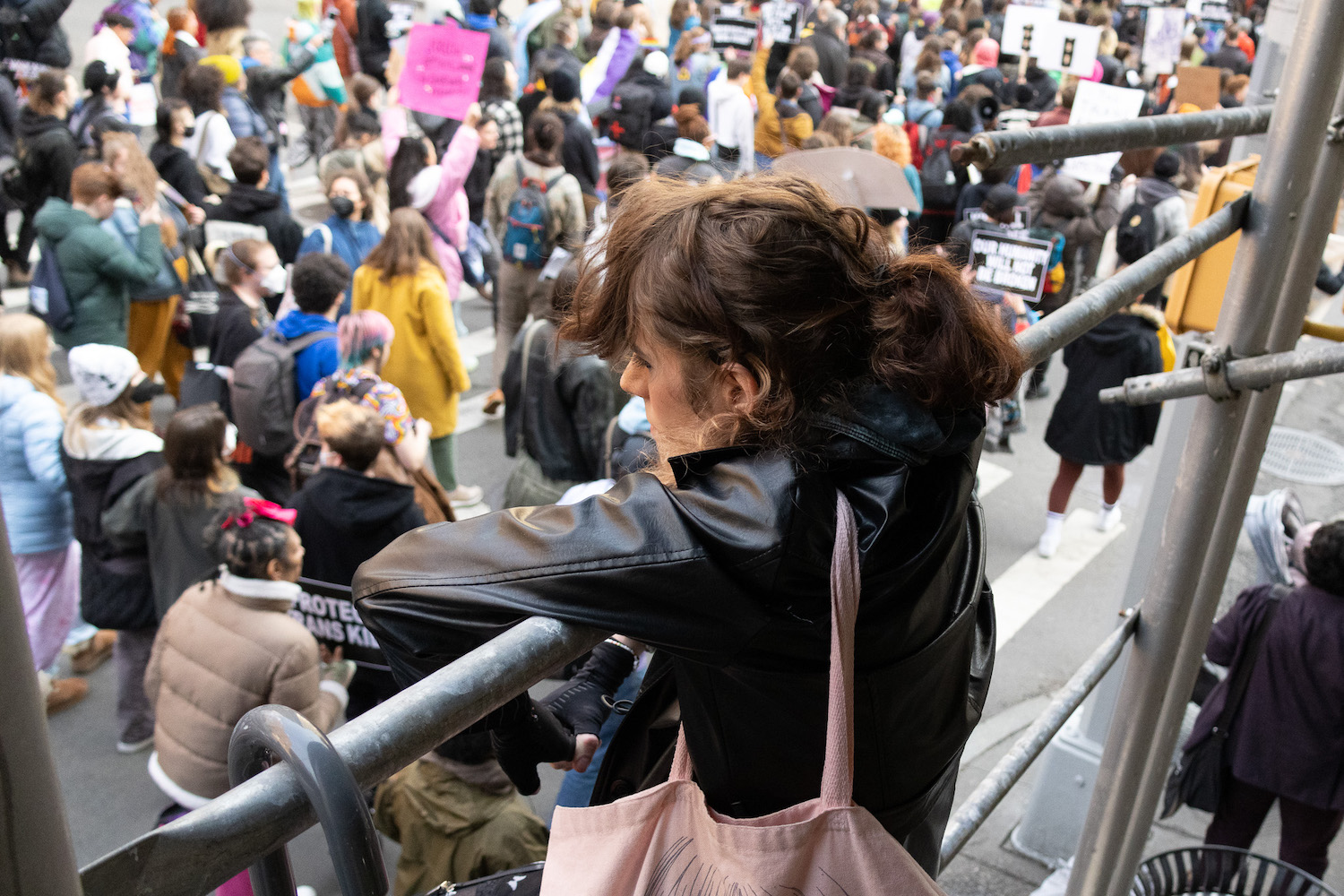
The stated reasoning behind such initiatives — whether expressed through the innocuous-seeming “just asking questions” approach, or the “grooming” narrative, which has deep ties to other right-wing and antisemitic conspiracies — is that children need to be protected from the insidious outward force of “transgenderism.”
The actual goal is much simpler: “They don’t want trans kids because they don’t want trans adults,” said Sylvia Breaux, an NYU student who spoke at the rally in Washington Square Park.
Anti-trans activists have no one’s best interests at heart — they simply want to harm transgender people who they do not see as human.
Alex Stein, a right-wing provocateur known for disrupting public events, briefly infiltrated the crowd, interrupting a speech by the alternative rock band BETTY. After his prompt removal from the stage, the band members urged us to respond to transphobia like his with love. Love, apparently, will somehow spontaneously prevail over hate. But Stein wasn’t ejected by love alone. He was swiftly, decisively and forcefully grabbed and shoved out of the plaza.
How can we hope to prevail passively, using only love? Love should certainly be what motivates us. We should always harness that power. But love is the end, not the means. We have a right to defend ourselves against opponents who incite and perpetrate violence against trans people. Pacifism is bound to fail when our enemies mean to eradicate us.
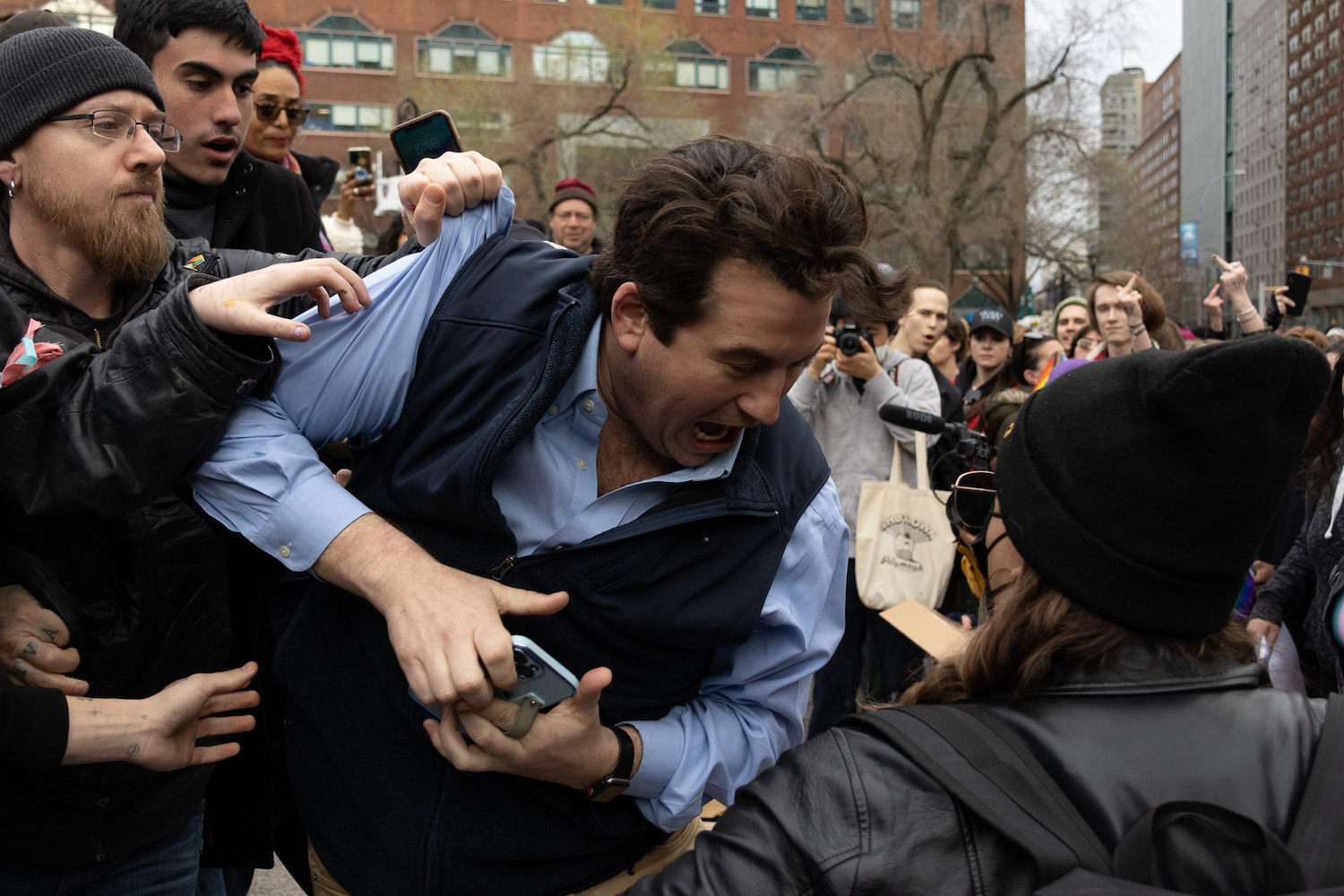
State legislatures across the country, especially those controlled by Republicans in the South, have introduced bills intended to impede and imperil the lives of trans people. Right-wing activists have called for even more extreme measures. However, when we call out their attempts to harm people like us, we cannot leave trans people in those states, who are not at fault for their lawmakers’ decision-making, in the crossfire.
“Fuck Tennessee! Fuck Texas!” one speaker shouted. They could have said “Fuck Bill Lee,” the Tennessee governor who recently approved a ban on gender-affirming health care for trans youth, or “Fuck Greg Abbott,” the Texas governor who has attempted to classify such care as child abuse.
Instead, the speaker at the rally took a linguistic shortcut that erased the vulnerable people living in those states, and the crowd cheered. Politicians like Lee and Abbott are the ones we should be condemning, not the people their policies hurt.
One sign I saw at the rally read “we won’t abandon the South.” On the whole, though, I’m troubled by how often I see trans people in the North who ignore the oppressed when criticizing the oppressors. It doesn’t help trans people in Southern states to conflate a government and its people.
Seeing as I am myself a trans person in the North, I reached out to Aurora Higgs, a Black trans activist in Richmond, Virginia, where Gov. Glenn Youngkin, a Republican, has introduced transphobic policies and supported anti-trans legislation. Higgs said that while she understands the impulse to rebuke states like Virginia, trans people and their allies ought to avoid equating people to their governments.
“In places where the legislative and normative culture is oppressive, you see really tight-knit communities that sprout out in rebellion,” Higgs said. “They deserve care; they deserve recognition for what they’re doing.”
Nationwide, Black trans women like Higgs face an imposing web of oppression — they are affected by forces of racism, sexism and transphobia. The broader trans rights movement has become better at recognizing this. At the same time, the idea of supporting Black trans women is more popular as a rhetorical cudgel than as a practice.
Higgs said using the deaths of Black trans women to prove a point creates a troubling phenomenon in which people like her are more valuable dead than alive, suggesting that allies go further than rhetoric by financially contributing to full-time activists and other trans advocates who confront the most discrimination in their daily lives.
“If people want our lives to be valued, and if they want to show value for our lives, they have to help keep us alive,” Higgs said.
Still, the goals of anti-trans oppressors are so extensive that mere visibility can be an act of resistance, too. Our enemies intend to remove us from public life entirely. Just existing as a trans person is, unfortunately, a meaningful political act.
Sonder O’Brien came out as nonbinary at 19, casting off the pressures they felt from the expectations of womanhood. Now 21 and attending college, they told me at the Washington Square Park rally that they sometimes feels overwhelmed by the breadth of anti-trans sentiment. Legislation, hate crimes, discrimination — sometimes, it feels like it’s coming from all sides.
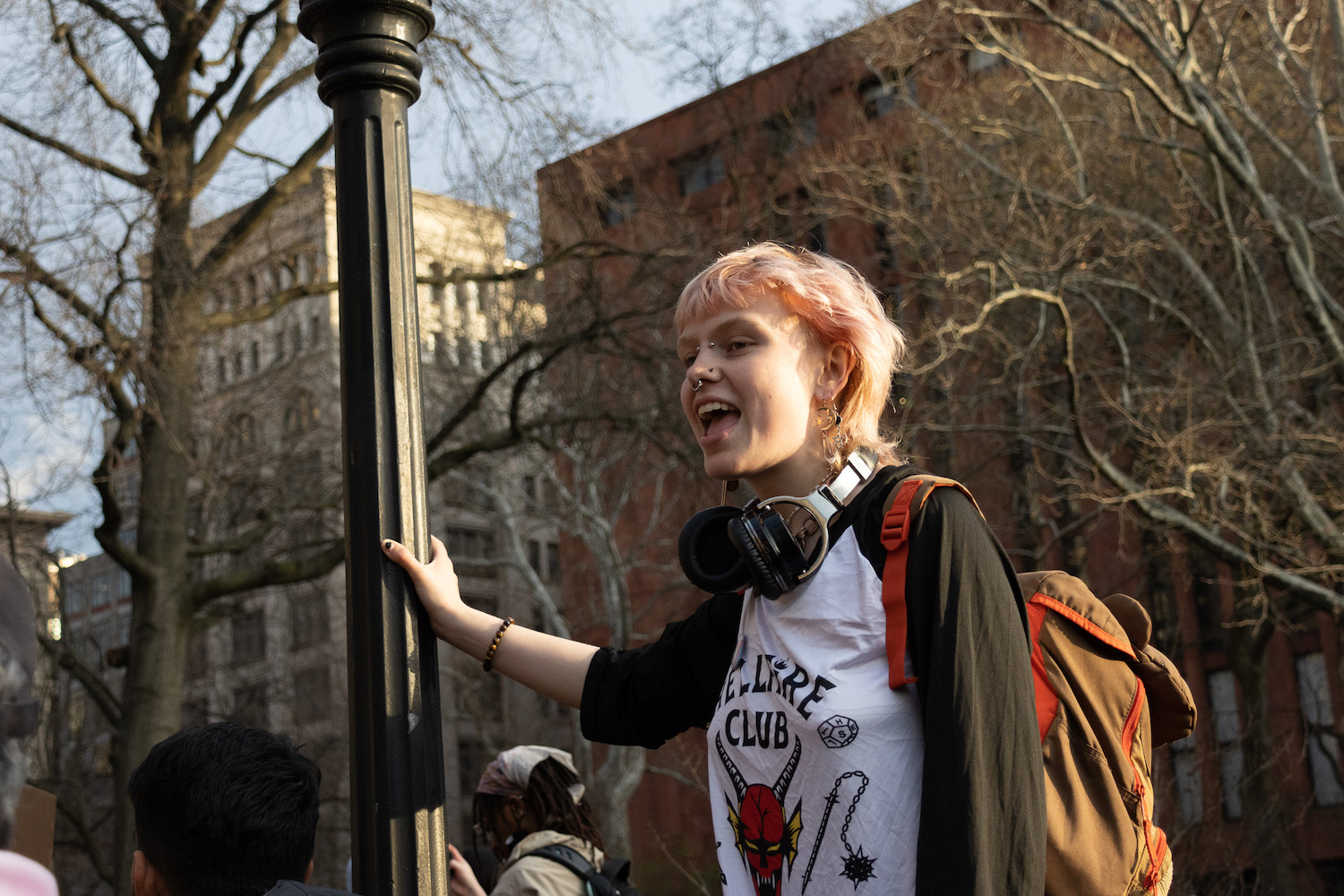
Sometimes, all you can do is stay home and nurture your last remaining shreds of hope. Other times, gathering in protest offers the relief of catharsis. There’s power in deliberately being vulnerable, in taking risks that prove that you refuse to be eradicated. There is power in being visible when you’re part of a group that some seek to render invisible.
Sometimes, catharsis is enough.
“We get to yell together, we get to scream together, we get to cry together,” O’Brien said.
But we also need coordination. As Higgs put it, a lasting trans rights movement must become a wall rather than a hurdle to its opposition.
In the meantime, trans love, trans joy and trans visibility will help get us there.
Contact Alex Tey at [email protected].

























































































































































